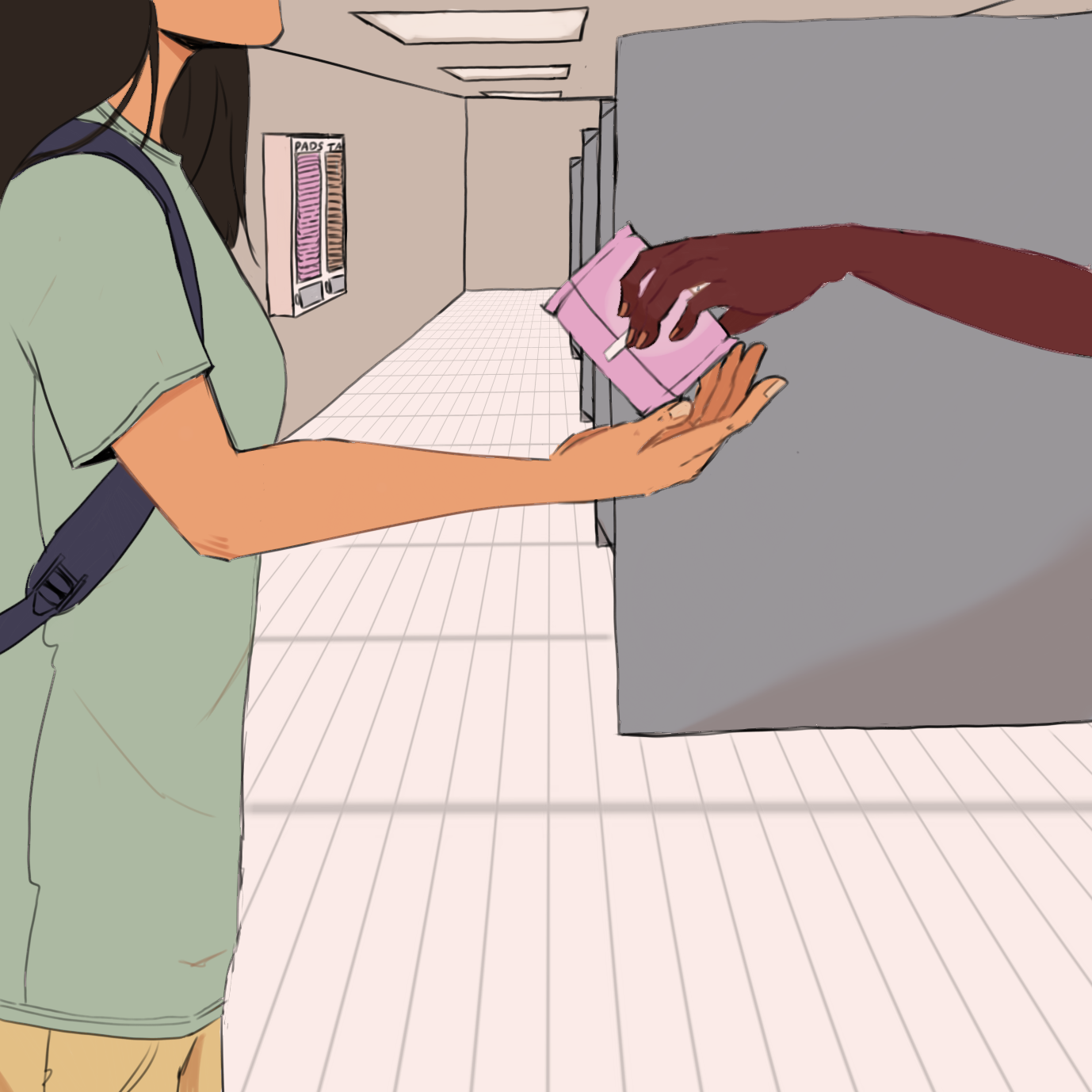NJ requires schools to provide students grades 6-12 free menstrual products

A student hands another student a pack of sanitary napkins (pads) in a girls' bathroom. ZFJ/Violet Bak
EDISON, N.J., Sept. 10 (ZFJ) — School districts in New Jersey are now required to provide menstrual products for free in public schools that teach students of any grade from six through twelve.
Applicable schools will have to provide tampons and sanitary napkins (pads) in at least half of all their female and gender-neutral bathrooms. The state government will shoulder the costs for doing so.
The law addresses period poverty—one in four students in the U.S. have struggled to afford menstrual products, according to a 2021 study—and also seeks to help students focus on learning and prevent infections.
“By providing free access to these essential products, we are not only promoting health and well-being but also erasing a potential source of discomfort and stigma,” said Dr. Angelica Allen-McMillan, acting commissioner of education.
Governor Phil Murphy signed the bill (S-1221/A-1349) into law on August 23, which is when the state Senate approved it.
“When students can’t access the menstrual products they need for their reproductive health, the potential stress and stigma too often distracts them from their classes or forces them to skip school entirely—leading to social and academic repercussions that no one should have to face,” said Murphy.
The state Education and Health Departments are required to periodically assess whether the menstruating students’ needs are met and can issue recommendations concerning expanding access to the products.
Numerous women’s health advocacy organizations praised the new law.
“This law recognizes that, as a society, we have an obligation to meet basic needs for all students, including those who get periods,” said Elise Joy, executive director of Girls Helping Girls. Period.
Some students have concerns about the quality and cleanliness of school-provided period products as well as availability for different sizes and flows.
The Office of Legislative Services estimates that the law will cost the state $1.8 million to $3.5 million in its first full school year and another $1.4 million to $2.9 million every subsequent year.
Based on 2020-2021 school year data, the Office estimates 1,383 schools will have to provide free menstrual products as a result of the law, covering about 354,497 students.
The bill is sponsored by Senate Majority Leader Teresa Ruiz, Assemblywoman Gabriela Mosquera, Senator Vin Gopal, and Assemblywomen Carol Murphy and Angela McKnight.
Zoe Wu contributed to this report.
References
- State of New Jersey, Governor Phil Murphy - Governor Murphy Signs Bill to Provide Access to Free Menstrual Products for Students in Grades Six through Twelve - https://nj.gov/governor/news/news/562023/approved/20230823a.shtml (ARCHIVE)
- New Jersey Legislature - Bill A1349 Aca (1R) - https://www.njleg.state.nj.us/bill-search/2022/A1349 (ARCHIVE)
- New Jersey Legislature - Bill S1221 ScaScaAca (3R) - https://www.njleg.state.nj.us/bill-search/2022/S1221 (ARCHIVE)
- New Jersey Senate - Third Reprint, Senate No. 1221, Establishes program in DOE to reimburse school districts for providing menstrual products in certain public schools and requires State to pay costs. - https://pub.njleg.state.nj.us/Bills/2022/S1500/1221_R3.PDF (ARCHIVE)
- New Jersey Assembly Appropriations Committee - Statement to Assembly No. 1349, June 22, 2023 - https://pub.njleg.state.nj.us/Bills/2022/A1500/1349_S3.PDF (ARCHIVE)
- PERIOD. - State of the Period 2021 - https://period.org/uploads/State-of-the-Period-2021.pdf (ARCHIVE)
